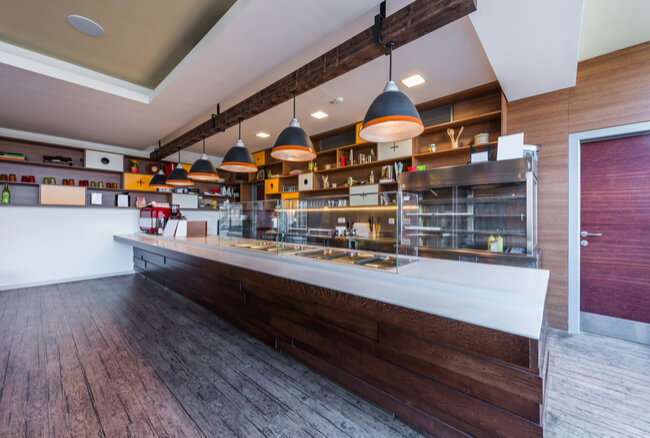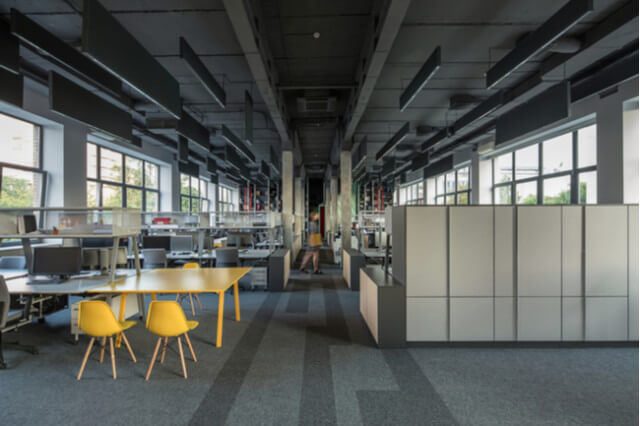
When it comes to choosing flooring for your business, there are many options available. Which one you choose will depend on where your business is located, what your budget is, the design you want, and what type of business you have. There are advantages and disadvantages to each type, so it just depends on what qualities you’re looking for.
Carpet is a popular flooring in places that get a high amount of traffic, such as schools or offices. Commercial vinyl is another durable flooring type. Wood floors look sleek and are often used in fancier restaurants.
Types of Flooring

Carpet flooring is popular in offices because it adds warmth and comfort to the space. Commercial carpets are different from residential carpets, as they’re made to endure more foot and equipment traffic. Most of these carpets are loop carpets, which makes them resilient and able to withstand the traffic that traverses them for years on end. For a more luxurious carpet, a mix of cut pile and loop can be combined to look fancier than a regular carpet. Carpet tiles can also be a smart choice because if one section gets damaged, it’s much easier to replace that section.
Another popular type of commercial flooring is vinyl due to how durable it is. It’s hard to damage this material, so scratches and dents won’t make their way onto it no matter how much traffic it gets. In an office, vinyl works well in waiting rooms, kitchens, or hallways. There are a variety of colors and designs to choose from. You can also buy it in a tile format if you prefer that style. Commercial vinyl flooring looks expensive and professional but is an affordable choice for your business.

Having a wood floor instantly increases the luxury factor of a business. Offices tend to look more trendier when they have wood flooring rather than carpet or other types of flooring. It is durable and easy to clean but is also more expensive than the other types of flooring. It’s important to make sure you never leave water on it when cleaning, as it will soak through and ruin it. You also need to be careful that it’s not around moisture, as it can expand, warp, and eventually need to be replaced. Wood flooring adds a nice comforting feel that works well in boutiques and modern office spaces, but if you’re laying it in a restaurant, be sure to limit its coverage to dining areas alone. The moisture and grease that inevitably builds up in a kitchen are not conducive to a long-lasting wood floor. You’ll also want to consider Engineered Hardwood floor over it’s solid counterpart. Not only can engineered be installed above or below grade (i.e. in commercial spaces that are not on the ground floor) but their cores are more dimensionally stable and will hold up better to unexpected moisture (i.e. the odd spilled drink in a restaurant, or rain tracked in on shoes and umbrellas in retail spaces).
What to Look for in Flooring

One of the first factors you’ll want to look at when purchasing flooring is the cost. That includes the installation and maintenance costs that may be associated with the lifetime of the floor. Keep the long run in mind and aim for a higher-quality floor. Although it may be more expensive initially, a more durable floor will save you time and money on repairs in the future. Don’t be tempted to get the flooring that’s the cheapest to purchase because chances are good that you’ll be spending hundreds if not thousands later to repair it.
Maintenance is another part you’ll want to consider. Think about how much time you’ll spend repairing your floors and if it’s worth it. Carpets are very simple to keep clean as long as you vacuum them regularly and quickly clean up spills. Vinyl or natural stone floors will require more buffing and deep cleaning on a regular basis to maintain their appearance. If your business is in an area prone to getting wet or having moisture, you’ll need a surface that water can’t get in to prevent expansion or mold growth.
How durable the floor will be is yet another essential factor. Some materials will wear out over the years, even when you maintain them on a regular basis. This means you’ll need to repair them often, which could be expensive. However, carpet is one relatively inexpensive material that may need to be replaced on a regular basis. If there are parts of your business that are more prone to damage or spills than others, consider getting tile flooring. This will make it easier to remove and replace parts of the floor instead of having to redo the entire area.
Flooring for High-Traffic Areas

Many businesses experience a high amount of traffic. If this includes your business, you’ll want to get a material that can endure that well. Carpet is a popular choice among large business offices, as it holds up well with hundreds of people walking on it every day. It’s also very easy to clean, so maintenance will be low key. Another low maintenance flooring option that stands up well to high amounts of traffic is ceramic or porcelain tile.

Concrete is another material that is good for areas of high traffic, as it can withstand high amounts of abuse. Many people can walk over it every day, and heavy items can be placed on it without it cracking. This works well in salons, restaurants, and retail spaces, and there are many decorative options to choose from. It is important to note that you will need a high-performance finish and coat to make sure it’s easy to maintain and doesn’t get any stains. The finish will help it resist stains and spills while creating a non-slip surface.
There are many types of flooring available, so you don’t have to compromise aesthetics just to save money. Come up with your budget first to establish how much you can spend on new flooring. Don’t forget to factor in any installation costs, maintenance, and repairs that will be needed in the years to come.
Consider how much traffic your business may receive so that you can choose the best and most durable floor. This will determine how often you have to replace the flooring. All of these factors will help you make the best decision on what type of flooring will work for you.
Resources:
https://www.builddirect.com/blog/carpet-tile-your-commercial-office-flooring-solution/
https://www.builddirect.com/blog/wood-flooring-in-commercial-spaces/
![[object Object]](https://assets.builddirect.com/images/logo-blue.png?auto=format&fit=max&w=384)





















